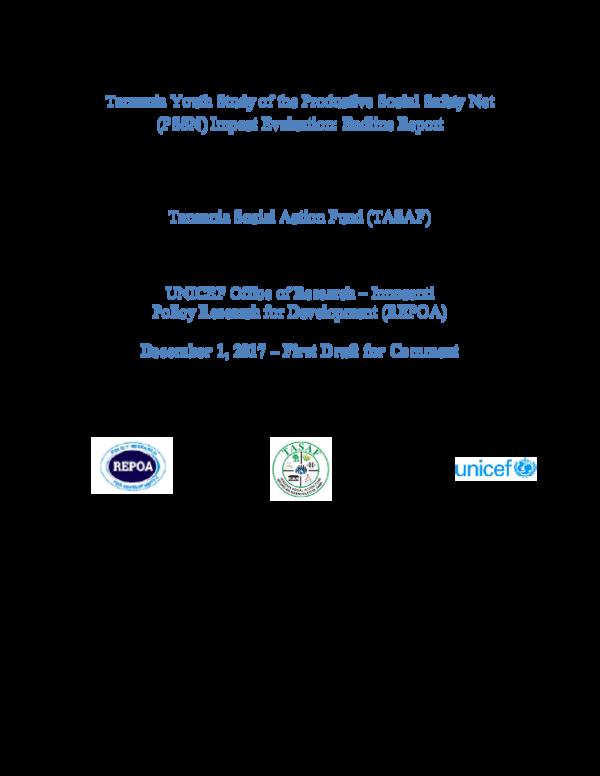The SDG Fund is operationally closed. This site is alive for knowledge and dissemination purposes.
Warning: This website is closed. Be aware of phishing or social engineering fraudulent requests of payments or certificates. Explore our programme areas.
Please visit jointsdgfund.org
Publication
UNICEF Tanzania Youth Study of the Productive Social Safety Net (PSSN) Impact Evaluation: Endline Report 2017
Published by: UNICEF

About
This report provides endline results of the impact evaluation of the Government of the Republic of Tanzania’s Productive Social Safety Net (PSSN) on Tanzanian youth. The impact evaluation is an 18-
month, mixed methods study to provide evidence on the effects that the programme has had on youth wellbeing and the transition to adulthood. The study was conducted among a sample of households
comprising part of the 4th and 5th scale-up waves of the PSSN in 2015. For the study we conducted two waves of data collection: a baseline in August – October 2015 and an endline from March – May
2017. In both waves of data collection, quantitative and qualitative interviews were conducted with youth who were between the ages of 14 and 28 years at baseline (15 – 30 years at endline). The
qualitative interviews were embedded into the quantitative study design, meaning that 16 youth from study households were selected to participate in in-depth qualitative interviews to help unpack pathways of impact and provide a deeper understanding of how the PSSN affects the lives of youth in participating households. At endline, households had received on average 10 bi-monthly cash
payments.
month, mixed methods study to provide evidence on the effects that the programme has had on youth wellbeing and the transition to adulthood. The study was conducted among a sample of households
comprising part of the 4th and 5th scale-up waves of the PSSN in 2015. For the study we conducted two waves of data collection: a baseline in August – October 2015 and an endline from March – May
2017. In both waves of data collection, quantitative and qualitative interviews were conducted with youth who were between the ages of 14 and 28 years at baseline (15 – 30 years at endline). The
qualitative interviews were embedded into the quantitative study design, meaning that 16 youth from study households were selected to participate in in-depth qualitative interviews to help unpack pathways of impact and provide a deeper understanding of how the PSSN affects the lives of youth in participating households. At endline, households had received on average 10 bi-monthly cash
payments.
View online / download
General Information
| SDGs | |
|---|---|
| Published | 2017 |
| Thematic Area | Food security and nutrition |

